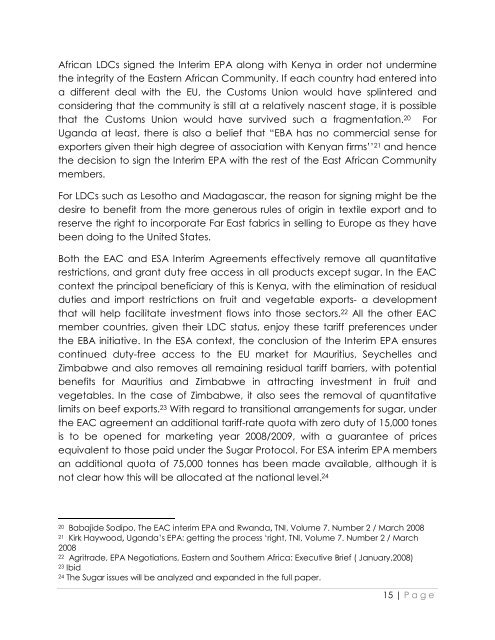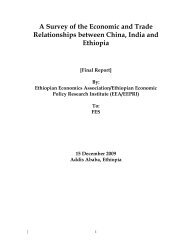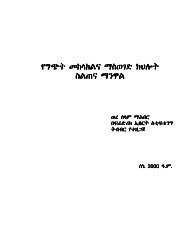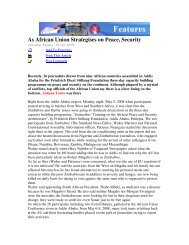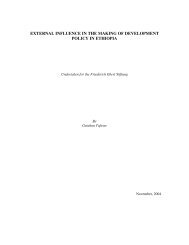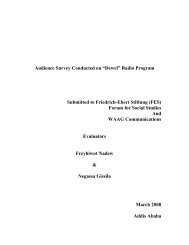Ethiopia and EPA Negotiation 2008 - FES Ethiopia
Ethiopia and EPA Negotiation 2008 - FES Ethiopia
Ethiopia and EPA Negotiation 2008 - FES Ethiopia
You also want an ePaper? Increase the reach of your titles
YUMPU automatically turns print PDFs into web optimized ePapers that Google loves.
African LDCs signed the Interim <strong>EPA</strong> along with Kenya in order not undermine<br />
the integrity of the Eastern African Community. If each country had entered into<br />
a different deal with the EU, the Customs Union would have splintered <strong>and</strong><br />
considering that the community is still at a relatively nascent stage, it is possible<br />
that the Customs Union would have survived such a fragmentation. 20 For<br />
Ug<strong>and</strong>a at least, there is also a belief that “EBA has no commercial sense for<br />
exporters given their high degree of association with Kenyan firms’’ 21 <strong>and</strong> hence<br />
the decision to sign the Interim <strong>EPA</strong> with the rest of the East African Community<br />
members.<br />
For LDCs such as Lesotho <strong>and</strong> Madagascar, the reason for signing might be the<br />
desire to benefit from the more generous rules of origin in textile export <strong>and</strong> to<br />
reserve the right to incorporate Far East fabrics in selling to Europe as they have<br />
been doing to the United States.<br />
Both the EAC <strong>and</strong> ESA Interim Agreements effectively remove all quantitative<br />
restrictions, <strong>and</strong> grant duty free access in all products except sugar. In the EAC<br />
context the principal beneficiary of this is Kenya, with the elimination of residual<br />
duties <strong>and</strong> import restrictions on fruit <strong>and</strong> vegetable exports- a development<br />
that will help facilitate investment flows into those sectors. 22 All the other EAC<br />
member countries, given their LDC status, enjoy these tariff preferences under<br />
the EBA initiative. In the ESA context, the conclusion of the Interim <strong>EPA</strong> ensures<br />
continued duty-free access to the EU market for Mauritius, Seychelles <strong>and</strong><br />
Zimbabwe <strong>and</strong> also removes all remaining residual tariff barriers, with potential<br />
benefits for Mauritius <strong>and</strong> Zimbabwe in attracting investment in fruit <strong>and</strong><br />
vegetables. In the case of Zimbabwe, it also sees the removal of quantitative<br />
limits on beef exports. 23 With regard to transitional arrangements for sugar, under<br />
the EAC agreement an additional tariff-rate quota with zero duty of 15,000 tones<br />
is to be opened for marketing year <strong>2008</strong>/2009, with a guarantee of prices<br />
equivalent to those paid under the Sugar Protocol. For ESA interim <strong>EPA</strong> members<br />
an additional quota of 75,000 tonnes has been made available, although it is<br />
not clear how this will be allocated at the national level. 24<br />
20 Babajide Sodipo, The EAC interim <strong>EPA</strong> <strong>and</strong> Rw<strong>and</strong>a, TNI, Volume 7. Number 2 / March <strong>2008</strong><br />
21 Kirk Haywood, Ug<strong>and</strong>a’s <strong>EPA</strong>: getting the process ‘right, TNI, Volume 7. Number 2 / March<br />
<strong>2008</strong><br />
22 Agritrade, <strong>EPA</strong> <strong>Negotiation</strong>s, Eastern <strong>and</strong> Southern Africa: Executive Brief ( January,<strong>2008</strong>)<br />
23 Ibid<br />
24 The Sugar issues will be analyzed <strong>and</strong> exp<strong>and</strong>ed in the full paper.<br />
15 | P a g e


